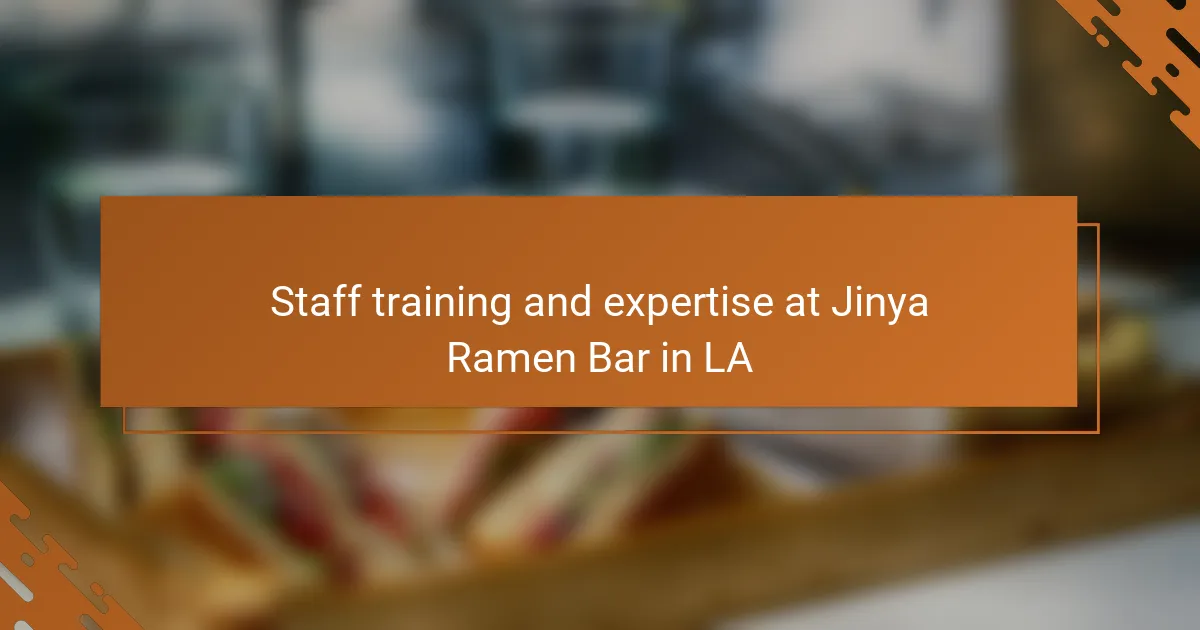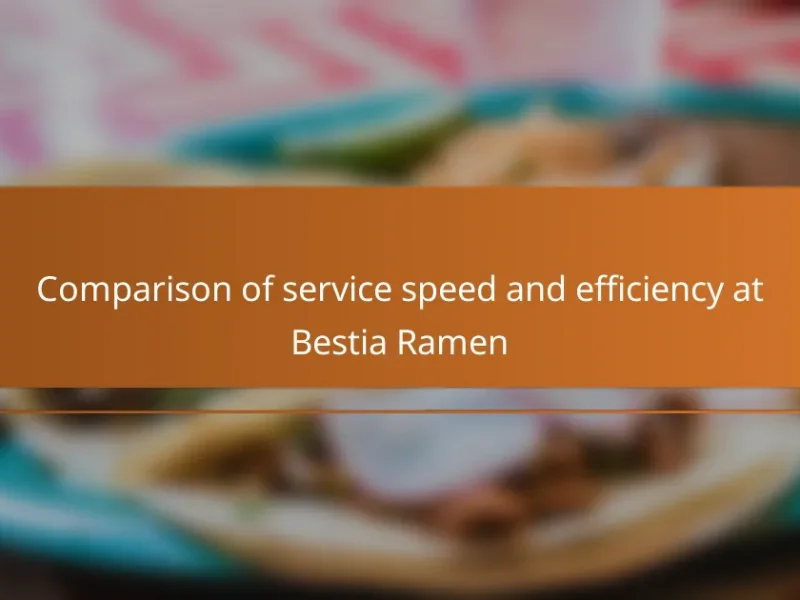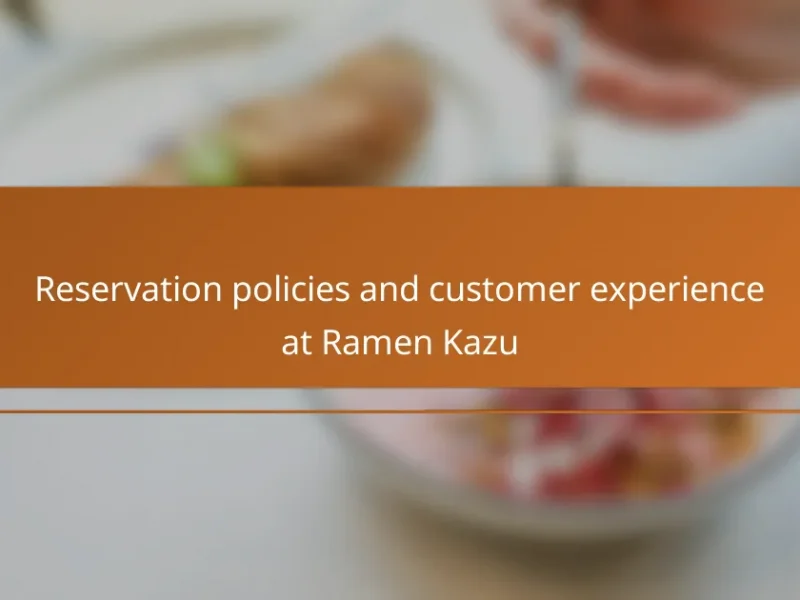
What is the significance of staff training and expertise at Jinya Ramen Bar in LA?
Staff training and expertise at Jinya Ramen Bar in LA are crucial for ensuring high-quality service and food preparation. Trained staff maintain consistent food quality, adhering to specific recipes and techniques. Expertise in ramen preparation enhances customer satisfaction through authentic flavors. Staff training also promotes efficient service, reducing wait times for customers. Knowledgeable employees can better address customer inquiries and preferences. This level of training contributes to a positive dining experience, fostering customer loyalty. Jinya Ramen Bar’s commitment to staff training is reflected in its high customer ratings and repeat business.
How does staff training contribute to the overall dining experience at Jinya Ramen Bar?
Staff training significantly enhances the overall dining experience at Jinya Ramen Bar. Trained staff provide knowledgeable recommendations about the menu. This expertise helps customers make informed choices. Proper training also ensures consistency in food and service quality. Staff are equipped to handle customer inquiries and special requests efficiently. Additionally, training fosters a welcoming atmosphere. Happy and well-trained employees contribute to positive customer interactions. A seamless dining experience leads to higher customer satisfaction and repeat visits.
What specific skills are emphasized during staff training?
Staff training at Jinya Ramen Bar in LA emphasizes skills in customer service, food preparation, and teamwork. Customer service skills include effective communication and problem-solving. Food preparation skills focus on cooking techniques and food safety practices. Teamwork skills involve collaboration and support among staff members. These skills are crucial for creating a positive dining experience. Training sessions often include role-playing and hands-on practice. This approach ensures staff are well-prepared for their roles.
How does staff expertise enhance customer service at Jinya Ramen Bar?
Staff expertise enhances customer service at Jinya Ramen Bar by ensuring knowledgeable and efficient interactions with customers. Trained staff can accurately answer menu questions and recommend dishes based on customer preferences. This expertise leads to quicker service and a more enjoyable dining experience. Furthermore, well-trained employees can handle customer complaints effectively, resolving issues promptly. Research shows that restaurants with knowledgeable staff have higher customer satisfaction ratings. A study by the National Restaurant Association indicates that 75% of diners value staff knowledge about menu items. This reinforces the importance of staff expertise in creating a positive atmosphere at Jinya Ramen Bar.
Why is ongoing training important for Jinya Ramen Bar staff?
Ongoing training is important for Jinya Ramen Bar staff to ensure high service quality and operational efficiency. Regular training updates staff on menu changes and new cooking techniques. This enhances food preparation consistency and flavor. Ongoing training also improves customer service skills, leading to better guest experiences. Furthermore, it fosters a culture of teamwork and communication among staff. Research shows that well-trained employees are more engaged and productive. According to a study by the Association for Talent Development, companies that offer comprehensive training programs see 218% higher income per employee. This emphasizes the value of ongoing training in enhancing both employee performance and business success.
What methods are used for ongoing staff training and development?
Jinya Ramen Bar in LA employs various methods for ongoing staff training and development. These methods include hands-on training sessions, online courses, and mentorship programs. Hands-on training allows staff to learn directly by preparing dishes and interacting with customers. Online courses provide flexibility for employees to enhance their skills at their own pace. Mentorship programs pair experienced staff with newer employees for personalized guidance. Regular workshops and team-building exercises also reinforce skills and foster a collaborative environment. These methods ensure that staff remain knowledgeable and competent in their roles.
How does continuous training impact staff retention and satisfaction?
Continuous training significantly enhances staff retention and satisfaction. It equips employees with updated skills and knowledge. This empowerment leads to greater job confidence and performance. Employees feel valued when companies invest in their development. Research indicates that organizations with continuous training have 34% higher employee retention rates. Furthermore, satisfied employees are 12% more productive. This correlation highlights the importance of ongoing training in maintaining a motivated workforce.

What are the core components of the training program at Jinya Ramen Bar?
The core components of the training program at Jinya Ramen Bar include culinary skills, customer service, and operational procedures. Culinary skills training focuses on noodle preparation, broth making, and ingredient knowledge. Customer service training emphasizes communication, order accuracy, and guest engagement. Operational procedures cover food safety, cleanliness, and equipment handling. Each component is designed to ensure staff deliver high-quality food and service. Jinya Ramen Bar’s training program aims to maintain consistency across all locations. This structured approach enhances both employee performance and customer satisfaction.
What topics are covered in the initial training for new staff?
Initial training for new staff at Jinya Ramen Bar in LA covers various essential topics. These include company culture, customer service standards, food safety protocols, and menu knowledge. Staff learn about the preparation and presentation of dishes. Training also emphasizes teamwork and communication skills. Employees are educated on the point-of-sale system and cash handling procedures. Health regulations and cleanliness standards are crucial components of the training. Additionally, staff receive training on handling customer feedback and complaints effectively. These topics ensure new employees are well-equipped to provide excellent service.
How is the culinary knowledge integrated into the training program?
Culinary knowledge is integrated into the training program at Jinya Ramen Bar through a structured curriculum. This curriculum includes hands-on cooking classes led by experienced chefs. Trainees learn essential techniques for preparing ramen and other dishes. The program emphasizes the importance of ingredient selection and flavor profiles. Additionally, staff participate in tastings to understand dish execution. Regular workshops are held to update knowledge on culinary trends. This comprehensive approach ensures staff are well-equipped to maintain quality standards.
What role does customer service training play in the program?
Customer service training is essential in the program at Jinya Ramen Bar in LA. It equips staff with the skills needed to provide exceptional customer experiences. Training focuses on communication, problem-solving, and product knowledge. Staff learn to handle customer inquiries effectively. This training leads to increased customer satisfaction and loyalty. Research shows that businesses with trained staff see a 20% increase in customer retention. Well-trained employees also contribute to a positive work environment. This enhances teamwork and morale among staff members. Overall, customer service training is a crucial component of the program.
How is the effectiveness of the training program evaluated?
The effectiveness of the training program is evaluated through performance assessments. These assessments include observing staff during shifts. Customer feedback is also collected and analyzed. Employee retention rates are monitored as a measure of satisfaction. Training outcomes are compared against set performance benchmarks. Regular evaluations ensure continuous improvement of the program. Data from these evaluations informs future training initiatives.
What metrics are used to assess staff performance post-training?
Key metrics used to assess staff performance post-training include productivity, customer satisfaction, and knowledge retention. Productivity is measured through sales figures and service speed. Customer satisfaction is evaluated using feedback surveys and online reviews. Knowledge retention is assessed through quizzes and practical demonstrations of skills. These metrics provide a comprehensive view of how effectively staff apply training in their roles. For instance, a study by the Association for Talent Development found that organizations that measure training effectiveness see a 24% improvement in employee performance.
How does feedback from customers influence training improvements?
Customer feedback directly influences training improvements by identifying specific areas for enhancement. When customers provide insights on service quality, staff knowledge, or product offerings, management can pinpoint gaps in training. This feedback allows for tailored training sessions that address the exact needs highlighted by customers. For instance, if patrons mention slow service, training can focus on efficiency and speed. Additionally, positive feedback can reinforce effective practices, ensuring staff continue to deliver high-quality service. Research indicates that businesses that actively incorporate customer feedback into training see a 10-15% increase in customer satisfaction scores. This correlation demonstrates the importance of feedback in shaping training programs effectively.

What unique attributes differentiate Jinya Ramen Bar’s training approach?
Jinya Ramen Bar’s training approach is distinguished by its emphasis on hands-on experience and cultural immersion. Employees undergo extensive training that includes learning traditional Japanese cooking techniques. This practical focus ensures that staff can replicate authentic flavors and presentation. Additionally, Jinya incorporates a mentorship system where experienced chefs guide new hires. This fosters a collaborative learning environment. The training also emphasizes customer service excellence, aligning with Jinya’s brand values. This holistic approach leads to a consistent dining experience across locations.
How does Jinya Ramen Bar’s training reflect its brand values?
Jinya Ramen Bar’s training reflects its brand values through a focus on authenticity and excellence. The training program emphasizes traditional ramen-making techniques. Employees learn to prepare dishes that align with the brand’s commitment to quality. This includes sourcing fresh ingredients and maintaining high standards. Additionally, staff are trained in customer service that embodies the brand’s values of hospitality. This ensures a welcoming environment for guests. The training also incorporates teamwork and collaboration, reinforcing a strong community spirit. Overall, Jinya Ramen Bar’s training aligns with its mission to provide an exceptional dining experience.
What cultural aspects are incorporated into the training process?
Cultural aspects incorporated into the training process at Jinya Ramen Bar include Japanese culinary traditions and customer service etiquette. The training emphasizes the importance of authenticity in ramen preparation, reflecting Japan’s rich food heritage. Staff learn about the origins of ingredients and traditional cooking techniques. Additionally, training includes understanding the cultural significance of hospitality in Japanese dining, known as “omotenashi.” This approach fosters a respectful and attentive service style. Furthermore, staff are educated on the nuances of Japanese dining customs, enhancing the overall guest experience. These cultural elements are integral to maintaining the brand’s identity and ensuring consistency in service and food quality.
How does Jinya Ramen Bar ensure consistency across its locations?
Jinya Ramen Bar ensures consistency across its locations through standardized training programs for staff. Each employee undergoes comprehensive training that covers food preparation, customer service, and restaurant operations. This training is designed to instill the same quality and service standards at every location. Additionally, Jinya employs a centralized supply chain to ensure uniformity in ingredients. Regular audits and feedback mechanisms are implemented to maintain high standards. This approach helps to deliver a consistent dining experience for customers regardless of the location.
What are some best practices for effective staff training in the restaurant industry?
Effective staff training in the restaurant industry involves comprehensive onboarding, ongoing education, and practical experience. Comprehensive onboarding ensures that new hires understand the restaurant’s culture, menu, and service standards. Ongoing education keeps staff updated on new menu items and industry trends. Practical experience allows staff to apply their knowledge in real-world scenarios.
Regular feedback sessions enhance communication and identify areas for improvement. Utilizing role-playing exercises can simulate customer interactions and improve service skills. Implementing mentorship programs pairs experienced staff with new hires for guidance.
According to a study by the National Restaurant Association, effective training can reduce employee turnover by up to 50%. This highlights the importance of structured training programs in retaining skilled staff.
How can other restaurants implement similar training strategies?
Other restaurants can implement similar training strategies by adopting a structured training program. This program should include hands-on training, mentorship, and regular feedback sessions. Jinya Ramen Bar emphasizes practical experience, allowing staff to learn through real-world scenarios. Additionally, incorporating a culture of continuous improvement is essential. Regular workshops and team-building activities can enhance staff cohesion and skills. Research shows that restaurants with robust training programs see a 20% increase in employee retention. This approach not only improves service quality but also fosters a motivated workforce.
What common challenges do restaurants face in staff training, and how can they be overcome?
Restaurants face several common challenges in staff training, including high turnover rates, inconsistent training methods, and varying skill levels among employees. High turnover can disrupt training continuity. To address this, restaurants can implement mentorship programs to enhance employee retention. Inconsistent training methods lead to varied service quality. Standardized training manuals and sessions can ensure uniformity across staff. Varying skill levels create disparities in performance. Tailored training programs can cater to individual employee needs, improving overall competency. Additionally, utilizing technology for training, such as online modules, can provide flexible learning options. These strategies collectively enhance staff training effectiveness in restaurants.
The primary entity of this article is staff training and expertise at Jinya Ramen Bar in LA. The article outlines the significance of comprehensive staff training in enhancing food quality, customer service, and overall dining experiences. It details specific training components such as culinary skills, customer service techniques, and the importance of ongoing training for employee retention and satisfaction. Additionally, the article highlights the unique attributes of Jinya’s training approach, including cultural immersion and mentorship, which contribute to consistent service quality across locations. Key metrics for evaluating training effectiveness and common challenges faced in the restaurant industry are also discussed.


